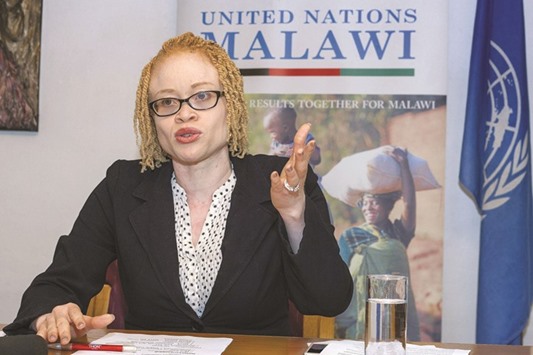People with albinism in Malawi are at risk of “systemic extinction” due to relentless attacks fuelled by superstitions, the United Nations’ top expert on albinism said yesterday on her first official visit in her new role.
At least 65 cases of violence against people with albinism including killings and dismemberment have been recorded by police in Malawi since late 2014, said Ikponwosa Ero, the UN’s independent expert on human rights and albinism.
People with albinism live in danger in regions of the world where their body parts are valued in witchcraft and can fetch a high price.
Superstition leads many to believe albino children bring bad luck.
Albinos were targeted because of beliefs that their body parts “can increase wealth, make businesses prosper or facilitate employment”, she said. “Even in death, they do not rest in peace as their remains are robbed from graveyards.”
Ero said she was “particularly alarmed by reports from persons with albinism that they are being called ‘money’ as they walk the streets and their neighbourhoods”.
In Malawi, where people with albinism number around 10,000 out of a population of around 16.5mn, the situation amounted to “an emergency, a crisis disturbing in its proportions”, she said.
Some of the Malawians with albinism she met compared their ordeal to that of endangered species in the wild, Ero told the Thomson Reuters Foundation in a phone interview from Malawi.
She said people with albinism are “an endangered people group facing a risk of systemic extinction over time if nothing is done”.
“We talk about protecting wildlife while not even prioritising efforts in protecting people with albinism,” she said.
Ero, who is from Nigeria and has albinism, took the job as the UN’s first independent expert on the issue last August.
Albinism is a congenital disorder affecting about one in 20,000 people worldwide who lack pigment in their skin, hair and eyes.
It is more common, however, in sub-Saharan Africa.
Attacks against people with albinism are particularly brutal, at times involving victims being dismembered alive by assailants wielding machetes, Ero said in her first report earlier this year.
She said she was particularly troubled during her Malawi trip by an encounter with a teenage boy, Alfred.
The 17-year-old with albinism had been found in a pool of blood a year ago after being stabbed during his sleep by machete-wielding attackers.
He was silent while meeting her, she said.
The boy hadn’t recovered and stopped attending school since the attack.
“You wonder what will become of this person,” said Ero.
Attacks against people with albinism this year have also been reported in Burundi, Mozambique and Zambia, according to Under the Same Sun, a Canadian advocacy charity.
Ero’s call for action came as a court in Malawi slapped a 17-year jail term on two men arrested last week for murdering a 21-year-old albino woman.
“The two pleaded guilty,” police spokesman Kondwani Kandiado told AFP.
Kandiado said the victim’s uncle Gerald Phiri, 38, and an accomplice told the court they “blamed Satan for their action and pleaded for leniency”.

Ikponwosa Ero
